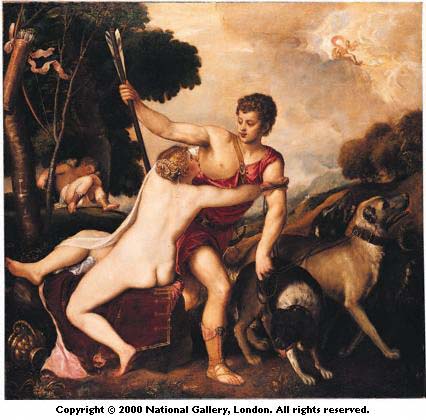Titian: Venus and Adonis
Shakespeare's Venus sees the last of her reluctant lover Adonis:
With this he breaketh from the sweet embrace
Of those fair arms which bound him to her breast
And homeward through the dark laund [forest clearing] runs apace;
Leaves Love upon her back, deeply distressed.
Look how a bright star shooteth from the sky,
So glides he in the night from Venus' eye*.
Shakespeare's poem calls on much of the same erotic energy as Titian's* painting: pursued by the Queen of Love, Adonis would rather be proving his manhood otherwise by hunting the boar--as the impatience of the dogs in the complete picture makes clear.
Titian and Shakespeare shared a common Renaissance interest in the richness of a classical mythology* that offered character, drama and the intensity generated by archetypal images.
Footnotes
-
Imagination and fancy
Lines 811-816. Coleridge quotes these lines in an important passage in the Biographia Literaria where he discusses the difference between "fancy" and "imagination"; this passage with its image suggestive of multiple connections between Venus and the shooting star is an example of the imaginative faculty, whereas an earlier line in the poem, where Venus taking Adonis by the hand is described as "a lily prisoned in a jail of snow" (362), is merely fanciful since the one area of comparison is whiteness.
-
The first modern painter?
The greatest of the Venetian painters of the Renaissance, Titian (c. 1490-1576) lived long enough to see many styles come and go. In his later years his techniques anticipated those of much later painters, including the Impressionists; he can in many ways be considered the first modern painter; click for a passage that describes his technique with oil paints.
-
Painting mythology
See also the painting of Mars and Venus by Sandro Botticelli. Titian's mythological figures are less modest, less Christianized by allegory--more openly pagan than Botticelli's.
Shakespeare was not the only poet of the period to draw on mythological subjects for narrative poems; click for more.
